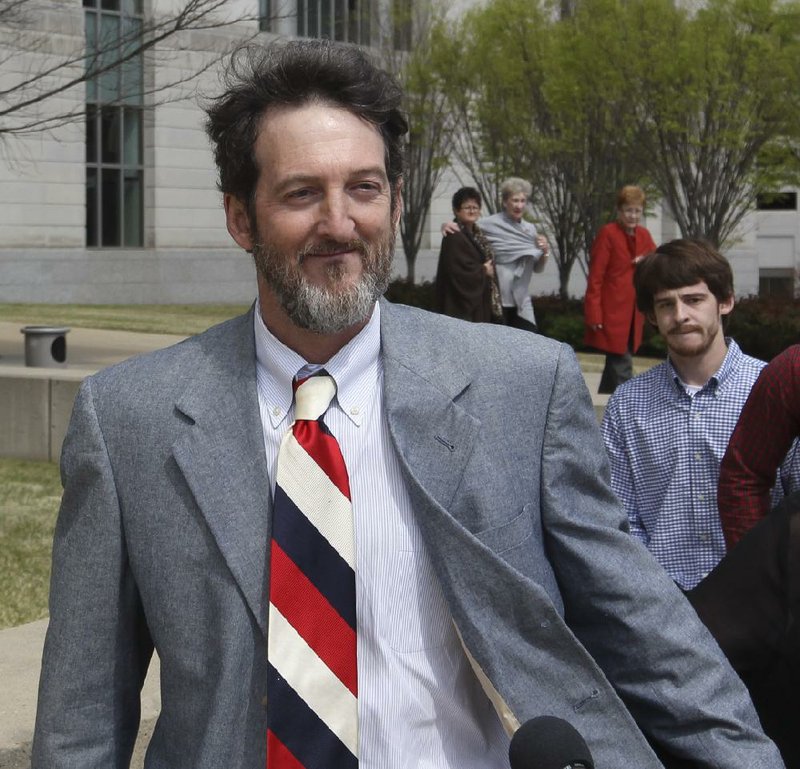CONWAY -- Attorneys in a civil lawsuit against nursing-home owner Michael Morton and lobbyist Gilbert Baker are at odds over whether a court should admit ousted Circuit Judge Michael Maggio's federal plea agreement as evidence in the case.
Morton's attorneys have argued that the January 2015 plea deal in which Maggio admitted taking a judicial bribe is hearsay. But the plaintiffs' attorneys countered in documents filed Wednesday that, even if it is hearsay, it's still admissible, in part because lawyers on both sides have been unable to question Maggio, who has appealed his conviction.
Also at issue are Maggio's sworn testimony in 2014 before the Arkansas Ethics Commission and newspaper articles that contain statements by Morton, Baker and Morton spokesman Matt DeCample.
Attorneys for the family of Martha Bull, a Perryville woman who died in Morton's Greenbrier nursing home in 2008, said Morton's lawyers had in an earlier filing "hidden" a request to exclude the plea agreement and other items.
On Wednesday, special Circuit Judge David Laser delayed a hearing on whether to dismiss the lawsuit after all parties agreed it was best to wait and see how Maggio's appeal before the 8th U.S. Circuit Court of Appeals goes and whether Maggio later will agree to answer attorneys' questions.
Laser said he realized that an appeals court decision could be "months away."
The lawsuit, filed in Faulkner County Circuit Court, accuses Morton and Baker of conspiring to bribe Maggio in July 2013 to lower a jury's $5.2 million judgment against the Greenbrier nursing home in a previous negligence case resulting from Bull's death. Two days after Morton sent tens of thousands of dollars to several political action committees that later donated to Maggio's judicial campaign at the time, Maggio lowered the verdict to $1 million.
Morton and Baker are not charged with a crime and deny wrongdoing.
Morton's lawyers advised Maggio in March that they wanted to ask him questions under oath, according to an affidavit by Brannon Sloan, one of the attorneys representing Bull's family.
"Maggio asserted his constitutional Fifth Amendment rights [against self-incrimination] during that deposition," Sloan said.
Further, all parties in the lawsuit have tried to question Maggio to no avail because he has repeatedly cited his Fifth Amendment rights, the Bull family's attorneys noted.
In July, Morton's attorneys said the Circuit Court "should hold that Maggio's plea agreement and the statements made at his plea hearing are inadmissible hearsay and cannot be considered as evidence to create a genuine issue of material fact sufficient to withstand summary judgment."
They said other such documents "that are clearly inadmissible hearsay" are the Ethics Commission summary of Maggio's testimony and some newspaper articles.
"Without Maggio's plea agreement, plaintiffs have offered no evidence that Morton bribed Maggio -- other than speculation based on the coincidence of the timing of Morton's checks to the PACs and the remittitur [lowered judgment] in the Bull case."
The plaintiffs said in Wednesday's filings that they do not concede the plea agreement is hearsay but said, even if it were, it still would be admissible under the Arkansas Rules of Evidence. When a person who testified at one hearing is no longer available to testify in another proceeding, the person's earlier testimony is admissible, they said.
Maggio's statements of guilt also are admissible because at the time he made them, "'a reasonable man in his position would not have made the statement unless he believed it to be true,'" the plaintiffs' attorneys said, citing the Arkansas Rules of Evidence.
The plea agreement also includes statements such as text messages between Baker and Maggio -- content that is not hearsay, the plaintiffs said.
As for the Ethics Commission summary, the plaintiffs said it is public record and as a result specifically excluded from the state's hearsay rule. The newspaper articles contain statements that "constitute admissions by a party-opponent and, therefore, are admissible," the plaintiffs said.
Maggio contends his original attorneys badgered him into the plea agreement. He also has cited other arguments, including one that the federal bribery law under which he was charged was improperly applied to his case.
State Desk on 09/08/2016
